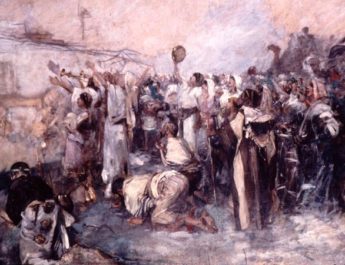1 Corinthians 2:1-16
Ordinary A11
1 When IA came to you, brothersB and sisters, I did not come proclaimingC the mysteryD of GodE to you in loftyF wordsG or wisdom.H
A “I” = kago. From kai (and, even, also, indeed) + ego (I, me). This is even I, but I, me also.
B “brothers” = adelphos. From a (with, community, fellowship) + delphus (womb). This is a brother in a literal or figurative sense. It is also used of another member of the Church.
C “proclaiming” = kataggello. 18x in NT. From kata (down, against, according to, throughout, among, daily) + aggello (to announce, report) {from aggelos (angel, messenger – supernatural or human envoy of God); probably from ago (lead, bring, drive, carry, guide, go)}. This is to proclaim openly and confidently a very specific message. It can also be celebrate, preach, or teach.
D “mystery” = marturion. 19x in NT. From martus (a witness whether having heard or seen something; witness literally, judicially, or figuratively; by analogy, a martyr). This is something that counts as evidence whether a witness, testimony, or other proof.
E “God” = theos. From Proto-Indo-European origins, meaning do, put, place. This is God or a god in general.
F “lofty” = huperoche. 2x in NT. From huperecho (to rise above, hold over, be superior, excel, surpass, be prominent, have authority, be more important) {from huper (over, beyond, on behalf of, concerning) + echo (to have, hold, possess)}. This is projection as a mountain peak projected upward. Figuratively, it can be eminence, excellence, superior, excellence, or authority. It can refer to a superior rank or character.
G “words” = logos. From lego (to speak, tell, mention). This is word, statement, speech, analogy. It is a word that carries an idea or expresses a thought, a saying. It could refer to a person with a message or reasoning laid out in words. By implication, this could be a topic, line of reasoning, or a motive. It can be used for a divine utterance or as Word – Christ.
H “wisdom” = sophia. From sophos (wise, clever, skilled, learned, cultivated); related to saphes (clear). This is skill, wisdom, insight, intelligence, clarity. It is wisdom as applied through a practical skill or shrewdness. It is not thoughtfulness or the mere gaining of intelligence for its own sake. Sophia is wisdom in action for everyday living.
2 For I decidedI to know nothing among you except JesusJ Christ,K and him crucified.L 3 And IM came to you in weaknessN and in fearO and in much trembling.P
I “decided” = krino. To judge, decide, think good, condemn, determine, pass judgment, stand trial, sue. This is judging whether it is done in court or in a private setting. Properly, it refers to mentally separating or distinguishing an issue – to come to a choice or decision, to just positively or negatively in seeking what is right or wrong, who is innocent or guilty. It can imply trying, condemning, punishing, or avenging.
J “Jesus” = iesous. From Hebrew Yehoshua (Joshua, the Lord is salvation); {from YHVH (proper name of the God of Israel; the self-existent and eternal one); from havah (to become) or from hayah (to come to pass, become, be) + yasha (to deliver, defend, help, preserve, rescue; properly, to be open, wide or free, which implies being safe. So, in a causative sense, this is to free someone.)} This is Jesus or Joshua in Greek – the Lord saves or the Lord is salvation.
K “Christ” = christos. From chrio (consecrate by anointing with oil; often done for prophets, priests, or kings). Literally, the anointed one, Christ. The Greek word for Messiah.
L “crucified” = stauroo. From stauros (upright stake, cross; literally the horizontal beam of a Roman cross, generally carried by the one convicted to die); from the same as histemi (to stand, cause to stand). This can be to attach someone to a cross or fencing with stakes. In a figurative sense, it could be to destroy, mortify, or subdue passions/selfishness.
M “and I” = kago. Same as “I” in v1.
N “weakness” = astheneia. From asthenes (without strength, sick, deprivation; weak in a moral or physical sense); {From a (not) + sthenes (strong, vigor) [from the base of sthenoo (to strengthen so that one can be mobile); from sthenos (strength)}. This is weakness, frailty, illness, suffering, or calamity. It is any kind of sickness or injury that includes weakness or diminishes your ability to enjoy or accomplish what you would choose.
O “fear” = phobos. From phobos (panic flight, fear, fear being caused, terror, alarm, that which causes fear, reverence, respect); from phebomai (to flee, withdraw, be put to flight). This is also to put to flight, terrify, frighten, dread, reverence, to withdraw or avoid. It is sometimes used in a positive sense to mean the fear of the Lord, echoing Old Testament language. More commonly, it is fear of following God’s path. This is where the word phobia comes from.
P “trembling” = tromos. 5x in NT. From tremo (shaking, particularly from fear or dread); from treo (to dread or terrify). This is trembling, shaking, or quaking from fear. This is the root of the terms “tremble” and “tremolo.”
4 My speechQ and my proclamationR were not with plausibleS words of wisdom, but with a demonstrationT of the SpiritU and of power,V 5 so that your faithW might rest not on humanX wisdom but on the power of God.
Q “speech” = logos. Same as “words” in v1.
R “proclamation” = kerugma. 9x in NT. From kerusso (proclaim, preach, publish; properly, to act as a herald – announcing something publicly with confidence and/or to persuade). This is proclamation – both the preaching and that which is preached. Sometimes times used to refer to the Gospel itself.
S “plausible” = peithos. 1x in NT. From peitho (to have confidence, urge, be persuaded, agree, assure, believe, have confidence, trust). This is persuasive, enticing, or skillful. Interestingly, the same root verb gives us the Greek word “pistos,” which is commonly translated “faith” (see v5).
T “demonstration” = apodeixis. 1x in NT. From apodeiknumi (to demonstrate, prove, display, exhibit, approve; literally, to show from; showing that something is what it says that it is) {from apo (from, away from) + deiknumi (to show, exhibit; figuratively, to teach, demonstrate, make known)}. This is proof, demonstration, or manifestation.
U “Spirit” = pneuma. From pneo (to blow, breath, breathe hard). This is wind, breath, or ghost. A breeze or a blast or air, a breath. Figuratively used for a spirit, the human soul or part of us that is rational. It is also used supernaturally for angels, demons, God, and the Holy Spirit. This is where pneumonia comes from.
V “power” = dunamis. From dunamai (to be able, have power or ability). This is might, strength, physical power, efficacy, energy, and miraculous power. It is force literally or figuratively – the power of a miracle or the miracle itself.
W “faith” = pistis. Related to “plausible” in v4. From peitho (see note S above). This is less about knowing, believing, and repeating a list of doctrines then it is about trusting God. Faith means listening to God and seeking to live a holy life even (and especially) when we don’t understand how everything works or fits together. Faith is about being faithful (trusting and doing) rather than being all knowing.
X “human” = anthropos. Probably from aner (man, male, husband) + ops (eye, face). This is human, humankind. Used for all genders.
6 Yet among the matureY we do speak wisdom, though it is not a wisdom of this ageZ or of the rulers of this age, who are doomed to perish.AA 7 But we speak God’s wisdom, secretBB and hidden, which God decreedCC before the ages for our glory.DD
Y “mature” = teleios. 19x in NT. From telos (an end, aim, purpose, completion, end goal, consummation, tax). This is going through the steps to complete a stage or phase and then moving on to the next one. This is reaching an end and so being complete or “perfect.” It is also full grown or mature.
Z “age” = aion. From the same as aei (ever, always, unceasingly, perpetually; on every occasion). This is an age, cycle of time, course, continued duration. It is also used to describe the eternal or forever. This is the word used to discuss the present age or the messianic age.
AA “doomed to perish” = katargeo. From kata (down, against, according to, among) + argeo (to delay, linger, be at rest, be idle, do nothing) [from argos (inactive, idle, lazy, thoughtless, useless, unemployed, unprofitable) {from a (not) + ergon (word, task, action, employment)]. This is making something inactive or bringing it to nothing. So, it could mean making something inoperative or powerless, annulling, or severing. It can also mean to make something ineffective or invalid.
BB “secret” = musterion. From mustes (an initiate); from mueo (to initiate someone into the secrets or mysteries of an order; to instruct learn, be disciples; properly, shutting your mouth and eyes to experience mystery); from muo (shutting eyes or mouth). This is a mystery or a secret doctrine that requires initiation to learn. In the New Testament, the plans of God were hidden until they were revealed in Christ through the Gospel. It is also used of Christian revelation in a broad sense rather than referring to something that cannot be known. This is the root of the word “mystery.”
CC “decreed” = proorizo. 6x in NT. From pro (before, above, ahead, in front of) + horizo (to set boundaries, determine, separate, designate, decree; literally, to set horizons) {from the same as horion (boundary, territory, region, frontier); from horos (boundary, limit)}. To mark out ahead of time – to pre-horizon or figuratively to pre-determine.
DD “glory” = doxa. From dokeo (to have an opinion, seem, appear, suppose; a personal judgment; to think); from dokos (opinion). This is literally something that evokes a good opinion – something that connects to our understanding of intrinsic worth. The ultimate expression of this is, of course, God and God’s manifestation. So, this is opinion, honor, and dignity, but also praise, glory, renown, and worship.
8 None of the rulers of this age understood this; for if they had, they would not have crucified the LordEE of glory.
9 But, as it is written,
“What no eye has seen, nor ear heard,
nor the human heartFF conceived,
what God has preparedGG for those who loveHH him”—
EE “Lord” = kurios. From kuros (authority, supremacy). This is a respectful address meaning master or sir. It refers to one who has control or power greater than one’s own. So, it was also applied to God and Jesus as Master or Lord.
FF “heart” = kardia. Literally the heart, but figuratively mind, character, inner self, will, intention, thoughts, feelings. Also, the center of something. The word heart is only used figuratively in the Old and New Testaments. This is where “cardiac” comes from.
GG “prepared” = hetoimazo. From hetoimos (make ready, be ready because of being prepared, standing by, adjusted; ready to meet some opportunity or challenge). This is to prepare or provide.
HH “love” = agapao. Perhaps from agan (much). This is love, longing for, taking pleasure in. It is human love that echoes divine love.
10 these things God has revealedII to us through the Spirit; for the Spirit searchesJJ everything, even the depthsKK of God. 11 For what human being knows what is truly human except the human spirit that is within? So also no one comprehends what is truly God’s except the Spirit of God.
12 Now we have received not the spirit of the world,LL but the Spirit that is from God, so that we may understand the gifts bestowedMM on us by God. 13 And we speak of these things in words not taught by human wisdom but taught by the Spirit, interpretingNN spiritual things to those who are spiritual.
II “revealed” = apokalupto. From apo (from, away from) + kalupto (to cover, hide, conceal; figuratively, to keep hidden or secret) {related to kalube (hut, cabin)}. This is properly to uncover so it means revealing something that was hidden or obstructed. It particularly refers to revealing the essence of something. This is to make plain or manifest. This is the root verb that “apocalypse” comes from.
JJ “searches” = ereunao. 6x in NT. From eraunao (to examine or search); may be from ereo (to call, say, tell, mention, command); perhaps from rheo (to command, make, say). This is to search diligently, examine, or investigate.
KK “depths” = bathos. 8x in NT. From bathus (deep in a literal or figurative sense); from the same root as basis (step, foot). This is depth, fullness, profundity, or immensity. This is where the term “bathysphere” comes from, but not the English word “bath.”
LL “world” = kosmos. Perhaps from the base of komizo (to carry, convey, recover); from komeo (to take care of). This is order, the world, the universe, including its inhabitants. Literally, this is something that is ordered so it can refer to all creation. It can also refer to decoration in the sense that something is better ordered and, thus, made more beautiful. This is were “cosmos” and “cosmetics” come from.
MM “bestowed” = charizomai. From charis (grace, kindness, favor, gratitude, thanks; being inclined to or favorable towards – leaning towards someone to share some good or benefit; literal, figurative, or spiritual; grace as abstract concept, manner, or action); from chairo (to rejoice, be glad; used to say hello; properly, delighting in the grace of God or experiencing God’s favor); from char– (to extend favor, lean towards, be inclined to be favorable towards). This is to extend grace or favor, to grant forgiveness, to pardon or rescue.
NN “interpreting” = sugkrino. Related to “decided in v2. 3x in NT. From sun (with, together with) + krino (see note I above). This is to combine or compare in order to interpret or explain. It is fitting truths together into a cohesive whole to discern what fits and understand interrelationships.
14 Those who are unspiritualOO do not receive the gifts of God’s Spirit, for they are foolishnessPP to them, and they are unableQQ to understand them because they are spirituallyRR discerned.SS 15 Those who are spiritual discern all things, and they are themselves subject to no one else’s scrutiny.TT
16 “For who has known the mindUU of the Lord
so as to instructVV him?”
But we have the mind of Christ.
OO “unspiritual” = psuchikos. 6x in NT. From psuche (breath, the breath of life, the self, individual, soul; that which makes a person unique – their identity, will, personality, affections; this isn’t the soul as the immortal part of us, but as our individuality; not life as a general concept, but specific to people); from psucho (to breathe, blow). This is natural, animal, sensitive, having the mind of the world. It relates to physical life and behavior. Pneumatikos (“spiritual” in v13) is the highest of our natures and phusikos is the lowest of our natures (our animal side). Psuchikos is in between.
PP “foolishness” = moria. 5x in NT. 5x in NT. From moros (dull, stupid, foolish, flat; literally, not having an edge; used figuratively for someone whose understanding is dull, is sluggish, acts in a brainless way, or does not fully have a grip on reality). This is foolishness, absurdity, or dullness. This is where the word “moron” comes from.
QQ “unable” = ou + dunamai. Literally “he is not able” or “he does not have the power.”
RR “spiritually” = pneumatikos. Related to “Spirit” in v4 & “spiritual” in v14. From pneuma (see note U above). 2x in NT. This is spiritually, mystically, or divinely. It speaks of a spiritual perspective or metaphysical dimension.
SS “discerned” = anakrino. Related to “decided” in v2 & “interpreting” in v13. 16x in NT. From ana (up, again, back, among, anew) + krino (see note I above). This is a very vigorous examination in that all of the factors are thoroughly judged, carefully studied. It was used forensically in the ancient world. It can be generally to investigate, determine, judge, or discern. It could also be used for interrogation or even torture for the purpose of interrogation.
TT “scrutiny” = anakrino. Same as “discerned” in v14.
UU “mind” = nous. From noos (mind) OR from the same as ginosko (to know, recognize, realize, perceive, learn; gaining knowledge through personal experience). This is mind, understanding, reasoning faculty, intellect, capacity to reflect. It can refer to God’s mind or human minds – thoughts, feelings, will, or reflective thinking.
VV “instruct” = sumbibazo. 7x in NT. From sun (with, together with) + the same as basis (foot, step, pace) {from baino (to walk to go)} OR sun (with, together with) + bibazo (to force ){from the same as basis (see above)}. This is joining together, considering, uniting, concluding, proving, or teaching. It is building reasoning – working through the steps to grasp truth by weaving ideas together to form a judgment or a conclusion. By extension, it is applying that understanding to showing or teaching.
Image Credit: “Living Cross” by Sarah Hall.




